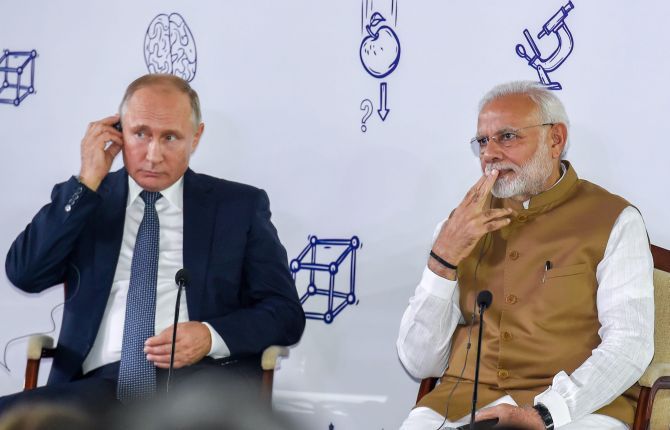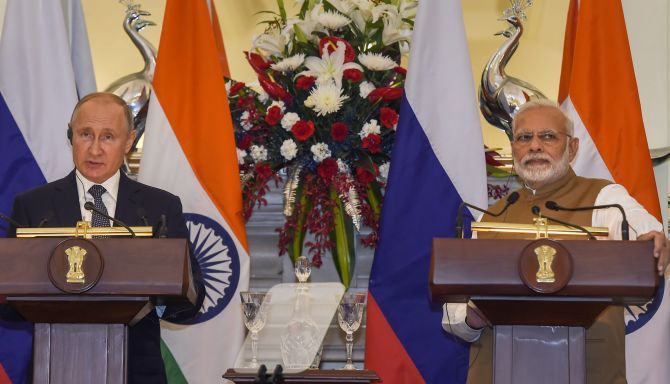Prime Minister Narendra Modi on Friday invited Russia to set up a dedicated defence industrial park in India as he looked to expand ties with New Delhi's traditional ally.

Speaking at a business meeting where visiting Russian President Vladimir Putin was also present, Modi said the trade between the two nations has risen 20 per cent in 2017-18.
Stating that India is the most open economy in respect to Foreign Direct Investment, he invited Russians to set up a dedicated defence industrial park in the country and take the traditional relationship forward.
"We are committed to building a new India. We have to do this as early as possible," he said.
Listing vast business opportunities in India, he said India is modernising its ports under Sagarmala project, building metro rail projects in 50 cities, expanding rail and road network and modernising airports.
India and Russia also signed a pact to further enhance cooperation in the area of nuclear energy and agreed to expand collaboration in the arena in third countries.
A joint statement issued after the 19th India-Russia summit between Modi and Putin in New Delhi said the two sides reiterated their commitment to further strengthen global non-proliferation, and Russia expressed its support for India's membership of the Nuclear Suppliers Group.
‘The sides noted the progress achieved in the construction of the remainder of the six power units at Kudankulam NPP as well as the efforts being made in the components manufacturing for localization. The sides welcomed consultations on the new Russian designed NPP in India, as well as on the NPP equipment joint manufacturing of nuclear equipment, cooperation in third countries,’ the joint statement said.
Russia reaffirmed its ‘unwavering support’ to India for a permanent seat in an expanded United Nations Security Council as both nations called for reform of the powerful UN organ to better reflect the current world order and make it more effective in dealing with emerging global challenges.
The strong backing by Russia was expressed in the joint statement.
Russia and India also underlined the importance of the full and effective implementation of the Joint Comprehensive Plan of Action (JCPOA) on the Iranian nuclear programme in order to support international peace and security, to strengthen non-proliferation regime and to develop normal economic cooperation with Iran.
The statement assumes significance amid US' warning to all purchasers of Iranian oil to bring it down to zero by November 4 or face imminent sanctions from it.

The two sides called for all issues related to the Iranian nuclear programme to be resolved peacefully and through dialogue.
Putin said interaction between young people of India and Russia, especially schoolchildren, would perhaps be the 'most important addition' to the 'unprecedented level' of bilateral ties and serve as a basis for a long-term cooperation.
Modi and Putin interacted with some young talents drawn from India's Atal Innovation Mission (AIM) and Russia's SIRIUS educational centre.
Modi, in his remarks, urged the youths of both the countries to work on innovation to improve the way of living of the poor and the needy.
An MoU was also signed between AIM and SIRIUS to further their cooperation.
"With cooperation of your counterparts, I am sure the interaction between young people, especially between schoolchildren, would be a great addition, and perhaps the most important addition, to the unprecedented level of India and Russia relations that we see these days," Putin said.
"This is the basis for a long-term cooperation," he said.
Modi also expressed his delight in meeting students of both the countries, and pitched for having sustained exchange programmes.
"This (Russian students' visit to India) should be taken forward. Indian students should visit Russian institutions, and more and more such exchanges should take place. India and Russian students together must think what can they do to make lives simpler for people, especially the poorest, to improve their way of living," he said.
The prime minister also asserted that every generation must have a 'scientific temper' whether a person turns into a scientist or not.

"Without innovation, (the development) of the world will come to a standstill," he said.
Putin earlier had a one-on-one meeting with the prime minister on Friday after his arrival in New Delhi on Thursday evening.
Modi had hosted a private dinner for the visiting dignitary.
During the interaction, the two leaders also took a few questions from both Russian and Indian students, on subjects such as value of teachers, scientists and areas of research.
Putin in his parting remarks, said, one student asked about the areas of research to work on, "One area is artificial intelligence. But without human intelligence, at least at this stage, it is impossible to fathom that an AI would be created. In order to continue with that, those who deal with cognitive sciences understand that the main thing is to work as a part of a team."
"So, I am really grateful to the Prime Minister for inviting talented, young Russians to India, which is a practical step to show that you are ready to work as part of a team. So we wish you every success," the Russian president said.

Brightest of minds from the two different countries were brought together by the spirit of innovation at the AIM-SIRIUS bootcamp in New Delhi.
At the initiative of the President Putin, since 2015 in Sochi has been started a year-round Educational Centre 'SIRIUS' (TALENT and SUCESS Foundation) for children who showed endowments in the fields of arts, science and sports.
Modi said he enjoys close friendship with Putin but the best gift the President gave to him was to take him to Sochi and meet those children.
"For the future of Russia, it is Putin's biggest investment, entire intellectual capabilities, commitment and emotion, he has invested in this (SIRIUS)," Modi said.
Putin to a question from a student on importance of teachers, said the prime minister invited me for dinner last night and one of subjects he discussed was education.
"So, it looks like education is something that receives a lot of attention in both India and Russia. We celebrate Teacher's Day on October 5 and India marks it on September 5... We are working on strengthening the importance of this area (education), both in theory and practice, and the evidence is this meeting in India," Putin added.

Modi also emphasised that in lives of great men, either their teacher or mother have played an instrumental role.
"I must say, the cooperation between BRICS countries, and this association made not very long time ago, brings meaningful contents to various areas. We are working together on finance, have created modern and much promising financial instruments, agreeing on cooperation in other areas, arts for example. For example, we are thinking about cooperating in humanitarian areas," Putin added.
The Russian president to a question on, which scientist had impressed him the most, said, "Hard to say, which book or which piece of music I like the best, all factors, arts, music, science, culture contribute to the development of mankind. But, I really envy people who have devoted their life to science."
India and Russia also asked all countries to fully implement the Paris Agreement on climate change while committing to promote green development and low-carbon economy.
In a joint statement issued after the 19th India-Russia annual summit between Modi and Putin, both the nations also asked developed countries to provide financial and technological support to developing economies to enhance their capability in mitigation and adaptation.
"The sides committed to further promote green development and low-carbon economy, in the context of sustainable development and poverty eradication," the statement said.

India and Russia also called upon all countries to fully implement the Paris Agreement adopted under the principles of the United Nations Framework Convention on Climate Change (UNFCCC) including the principles of common but differentiated responsibilities and respective capabilities.
They also urged developed countries to provide financial, technological and capacity-building support to developing countries to enhance their capability in mitigation and adaptation, the statement said.
The Paris Agreement aims to strengthen the global response to the threat of climate change by keeping the global temperature rise this century under two degrees Celsius above pre-industrial levels. It also aims to pursue efforts to limit the temperature increase even further to 1.5°C.
Both India and Russia also decided to explore possibilities of closer cooperation on hydel and renewable energy sources, energy efficiency further to reduce the negative effects of climate change.
Both the countries also noted that civil nuclear cooperation between India and Russia is an important component of strategic partnership contributing to India's energy security and its commitments under the Paris Agreement on climate.
During the India-Russia annual summit, eight pacts, including on cooperation on India's ambitious human space mission project Gaganyaan, were signed.
Official sources said the two countries also signed the USD 5 billion S-400 air defence system deal after talks between the two leaders in Hyderabad House.
Putin was received by External Affairs Minister Sushma Swaraj on his arrival on Thursday.
He had gone straight to Modi's official Lok Kalyan Marg residence where the two leaders had a one-on-one meeting. Later, Modi hosted a private dinner for the visiting dignitary.










 © 2025
© 2025